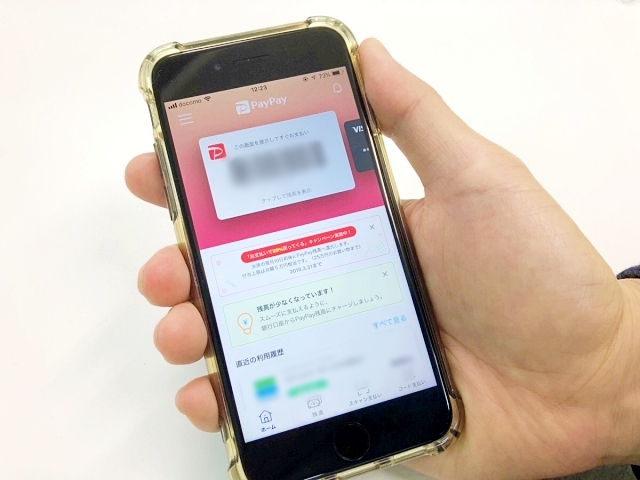
Crime doesn’t PayPay.
Of the many new electronic payment services that have emerged in Japan in the last few years, PayPay is probably the largest. Having arrived on the scene early with aggressive discount campaigns, and somehow evaded trademark complaints from PayPal, they scooped up a large market share and can now be used to pay for goods and services at most businesses around the country.
However, with such wide usage comes the threat of misuse, as recently happened in an incredibly bold fraud attempt in Misato City, Saitama Prefecture. Restaurant owner Takuya Takahashi was arrested on suspicion of tricking a discount store into thinking he paid for 8,200 yen (US$75) worth of food over several visits in August of last year.
When using PayPay, the customer first scans the store’s QR code with their smartphone app. They then enter an amount of money and tap the “payment” button, this completes the purchase which is confirmed with a little voice saying “PayPay♫”
▼ Video demonstration of the process with the “PayPay♫” sound at the end
When Takahashi was at the checkout, rather than tapping “payment” he instead made his phone play a recording of the “PayPay♫” chime, tricking the cashier into thinking the payment went through. It would seem that the staff wasn’t paying attention to the message on the screen and just cleared it after the audible “PayPay♫” cue was heard.
After some time, the store began to notice that they were coming up short only at the end of days that Takashi had visited. Upon this realization, they reported it to police and an investigation was launched which resulted in his arrest. While in custody, Takashi reportedly admitted to the crime saying that he was dealing with money problems.
As wrong as it is, it’s hard to deny the cleverness and audaciousness that goes into pulling it off. Readers of the news too, while largely condemning the act, had to give credit where credit’s due.
“Hahaha!”
“Oh, that’s freaking funny.”
“That’s pretty clever.”
“It never would have occurred to me to do that.”
“I’m rather impressed with the idea.”
“If he hadn’t kept doing it at the same place, he might have gotten away with it.”
“Didn’t they notice that no receipt came out?”
“Smart but wrong.”
If the comments are anything to go by, it would seem there are many ways Takashi’s scheme should have been discovered, such as a lack of receipt. Possibly because he was a restaurant owner himself, he may have been able to use his own experience to figure out a way to smooth-talk the clerk and circumvent the payment routine to his advantage. Most likely he tried this scheme at a few places before finding one with just the right blind spots for it to succeed, which is why he kept going back there.
These types of payment systems are still relatively new in Japan, so it would seem some businesses need more time to get accustomed to them. It could be argued that automatic tellers are the solution, but even with those, unethical shoppers in Japan have proven themselves to be quite resourceful.
Source: TBS News, Itai News
Top image: ©SoraNews24
● Want to hear about SoraNews24’s latest articles as soon as they’re published? Follow us on Facebook and Twitter!

 567 cartons of cigarettes bought with 120 smartphones at once leads to arrest in Chiba
567 cartons of cigarettes bought with 120 smartphones at once leads to arrest in Chiba The mystery of the phantom “sake pass card” at Japanese alcohol vending machines
The mystery of the phantom “sake pass card” at Japanese alcohol vending machines Man arrested for robbing Tokyo convenience store with nose hair trimmer
Man arrested for robbing Tokyo convenience store with nose hair trimmer Japanese police question man for “not looking good in a suit,” turns out he robbed an old lady
Japanese police question man for “not looking good in a suit,” turns out he robbed an old lady How to use Japanese convenience store Lawson’s self-checkout terminals
How to use Japanese convenience store Lawson’s self-checkout terminals Foreigner’s request for help in Tokyo makes us sad for the state of society
Foreigner’s request for help in Tokyo makes us sad for the state of society Japanese-style accommodation at the new Premium Dormy Inn hotel in Asakusa will blow your mind
Japanese-style accommodation at the new Premium Dormy Inn hotel in Asakusa will blow your mind Seaside scenery, history, and so many desserts on Yokohama’s Akai Kutsu【Japan Loop Buses】
Seaside scenery, history, and so many desserts on Yokohama’s Akai Kutsu【Japan Loop Buses】 Mikado Coffee is a 76-year-old coffee chain with a major celebrity connection
Mikado Coffee is a 76-year-old coffee chain with a major celebrity connection Smash Bros. director Sakurai stabs Kirby in the face, has delicious justification for it
Smash Bros. director Sakurai stabs Kirby in the face, has delicious justification for it It’s the RocketNews24 Christmas Party! Coming to you from the McDonald’s off Highway 8
It’s the RocketNews24 Christmas Party! Coming to you from the McDonald’s off Highway 8 Ginza hotel serves up one of the best breakfasts in Tokyo
Ginza hotel serves up one of the best breakfasts in Tokyo Keeping up with the kids: Japanese high schoolers’ most popular slang of Spring 2022
Keeping up with the kids: Japanese high schoolers’ most popular slang of Spring 2022 French Fries Bread in Tokyo’s Shibuya becomes a hit on social media
French Fries Bread in Tokyo’s Shibuya becomes a hit on social media Japanese breast size study shows rapid growth in previously smallest-busted region of county
Japanese breast size study shows rapid growth in previously smallest-busted region of county McDonald’s new Happy Meals offer up cute and practical Sanrio lifestyle goods
McDonald’s new Happy Meals offer up cute and practical Sanrio lifestyle goods Japanese ramen restaurants under pressure from new yen banknotes
Japanese ramen restaurants under pressure from new yen banknotes Red light district sushi restaurant in Tokyo shows us just how wrong we were about it
Red light district sushi restaurant in Tokyo shows us just how wrong we were about it New private rooms on Tokaido Shinkansen change the way we travel from Tokyo to Kyoto
New private rooms on Tokaido Shinkansen change the way we travel from Tokyo to Kyoto Tokyo Tsukiji fish market site to be redeveloped with 50,000-seat stadium, hotel, shopping center
Tokyo Tsukiji fish market site to be redeveloped with 50,000-seat stadium, hotel, shopping center Japanese city loses residents’ personal data, which was on paper being transported on a windy day
Japanese city loses residents’ personal data, which was on paper being transported on a windy day Beautiful Ghibli sealing wax kits let you create accessories and elegant letter decorations【Pics】
Beautiful Ghibli sealing wax kits let you create accessories and elegant letter decorations【Pics】 Secret Kitchen bento serves Japanese flowers, birds, wind and moon in a box, but is it worth it?
Secret Kitchen bento serves Japanese flowers, birds, wind and moon in a box, but is it worth it? New definition of “Japanese whiskey” goes into effect to prevent fakes from fooling overseas buyers
New definition of “Japanese whiskey” goes into effect to prevent fakes from fooling overseas buyers Our Japanese reporter visits Costco in the U.S., finds super American and very Japanese things
Our Japanese reporter visits Costco in the U.S., finds super American and very Japanese things Studio Ghibli releases Kiki’s Delivery Service chocolate cake pouches in Japan
Studio Ghibli releases Kiki’s Delivery Service chocolate cake pouches in Japan All-you-can-drink Starbucks and amazing views part of Tokyo’s new 170 meter-high sky lounge
All-you-can-drink Starbucks and amazing views part of Tokyo’s new 170 meter-high sky lounge More foreign tourists than ever before in history visited Japan last month
More foreign tourists than ever before in history visited Japan last month New Pokémon cakes let you eat your way through Pikachu and all the Eevee evolutions
New Pokémon cakes let you eat your way through Pikachu and all the Eevee evolutions Disney princesses get official manga makeovers for Manga Princess Cafe opening in Tokyo
Disney princesses get official manga makeovers for Manga Princess Cafe opening in Tokyo Sales of Japan’s most convenient train ticket/shopping payment cards suspended indefinitely
Sales of Japan’s most convenient train ticket/shopping payment cards suspended indefinitely Sold-out Studio Ghibli desktop humidifiers are back so Totoro can help you through the dry season
Sold-out Studio Ghibli desktop humidifiers are back so Totoro can help you through the dry season Japanese government to make first change to romanization spelling rules since the 1950s
Japanese government to make first change to romanization spelling rules since the 1950s Ghibli founders Toshio Suzuki and Hayao Miyazaki contribute to Japanese whisky Totoro label design
Ghibli founders Toshio Suzuki and Hayao Miyazaki contribute to Japanese whisky Totoro label design Doraemon found buried at sea as scene from 1993 anime becomes real life【Photos】
Doraemon found buried at sea as scene from 1993 anime becomes real life【Photos】 Tokyo’s most famous Starbucks is closed
Tokyo’s most famous Starbucks is closed One Piece characters’ nationalities revealed, but fans have mixed opinions
One Piece characters’ nationalities revealed, but fans have mixed opinions We asked a Uniqlo employee what four things we should buy and their suggestions didn’t disappoint
We asked a Uniqlo employee what four things we should buy and their suggestions didn’t disappoint Osaka man arrested after paying phone bill in the middle of crime spree
Osaka man arrested after paying phone bill in the middle of crime spree Clash of the instant ramen! Taste-testing seven instant noodles on a flavor trip across Kyushu
Clash of the instant ramen! Taste-testing seven instant noodles on a flavor trip across Kyushu We tried super spicy wasabi ramen and yakisoba that’s rumored to make anyone cry【Taste Test】
We tried super spicy wasabi ramen and yakisoba that’s rumored to make anyone cry【Taste Test】 Wear your love of anime on your stomach with Totoro Tummy hoodies and tees
Wear your love of anime on your stomach with Totoro Tummy hoodies and tees Revolutionary new A.I. self-checkout system in Japan calculates all your items with one glance
Revolutionary new A.I. self-checkout system in Japan calculates all your items with one glance We snagged an excellent haul in the 2021 Evangelion fukubukuro lucky bag
We snagged an excellent haul in the 2021 Evangelion fukubukuro lucky bag Saitama welfare official threatened into giving out executive-level-salary worth of benefits
Saitama welfare official threatened into giving out executive-level-salary worth of benefits No coins? Not a problem for Japan’s new cashless gachapon capsule toy vending machines
No coins? Not a problem for Japan’s new cashless gachapon capsule toy vending machines Man arrested for hunting the nerdiest game: Akihabara otaku
Man arrested for hunting the nerdiest game: Akihabara otaku Woman arrested for pocketing change worth US$370, claims she “didn’t notice”
Woman arrested for pocketing change worth US$370, claims she “didn’t notice” Saitama man arrested for calling police 2,060 times in 9 days to yell at them
Saitama man arrested for calling police 2,060 times in 9 days to yell at them “Donald Trump” fraudster accused of scamming confused citizens in Japanese phone scam
“Donald Trump” fraudster accused of scamming confused citizens in Japanese phone scam Food delivery service’s payment processing error allows some people to eat for free…for 3 years
Food delivery service’s payment processing error allows some people to eat for free…for 3 years Yu-Gi-Oh! Creator Draws His Characters Playing Pokémon Go
Yu-Gi-Oh! Creator Draws His Characters Playing Pokémon Go What happens when a 40-something dude goes to an anime boy band fan event? Something emotional
What happens when a 40-something dude goes to an anime boy band fan event? Something emotional
Leave a Reply